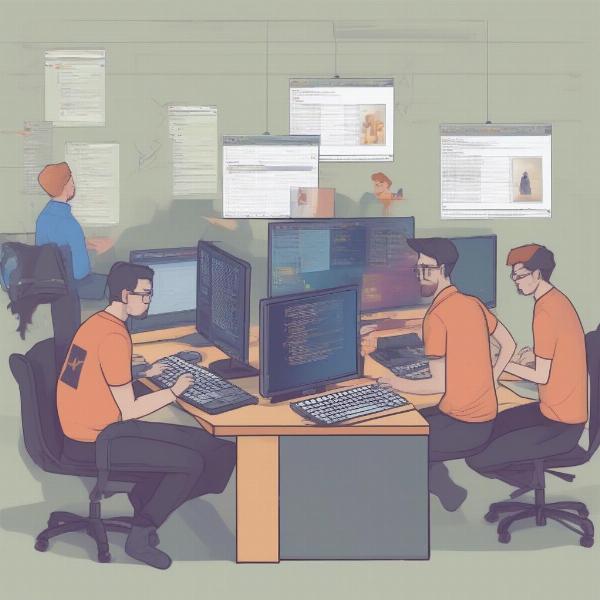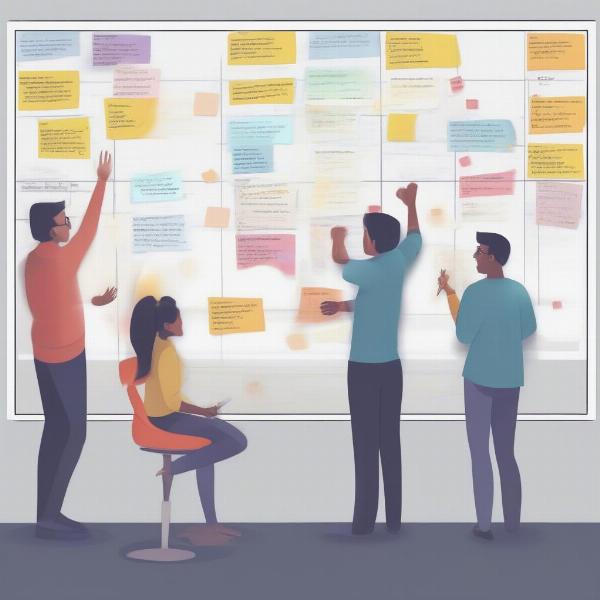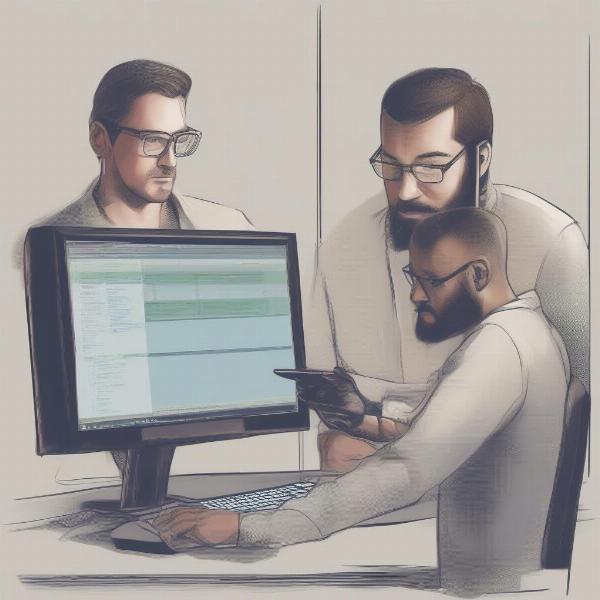Managing multiple people working on a single game is a complex but crucial aspect of game development. Whether you’re a small indie team or a large studio, effective collaboration is key to bringing your vision to life. This article delves into the strategies and tools that can help you streamline your workflow and keep your team on track.
Breaking Down the Challenges of Multi-Person Game Development
Game development is inherently multifaceted, involving programmers, artists, designers, writers, and more. Coordinating these diverse skill sets requires careful planning and communication. Common challenges include:
- Version Control: Keeping track of different versions of assets and code can quickly become a nightmare without a robust system.
- Communication Breakdown: Misunderstandings and conflicting ideas can derail progress if not addressed promptly.
- Task Management: Assigning tasks, tracking progress, and ensuring accountability is essential for staying on schedule.
- Conflicting Styles: Different team members may have varying artistic or coding styles, leading to inconsistencies if not managed effectively.
Essential Tools for Managing a Game Development Team
Fortunately, several tools can help mitigate these challenges and foster a productive work environment. These tools fall into several categories:
- Version Control Systems (VCS): Git, Perforce, and Plastic SCM are popular choices. These systems track changes to files, allowing for easy rollback and collaboration.
- Project Management Software: Trello, Jira, and Asana can help organize tasks, assign responsibilities, and track progress.
- Communication Platforms: Slack, Discord, and Microsoft Teams facilitate real-time communication, file sharing, and feedback.
- Game Engines: Many game engines, such as Unity and Unreal Engine, have built-in collaboration features, streamlining workflows within the engine itself.
 Version Control in Game Development
Version Control in Game Development
Effective Strategies for Collaboration
Implementing the right tools is just the first step. Effective collaboration also requires adopting the right strategies:
- Establish Clear Roles and Responsibilities: Each team member should have a well-defined role and understand their responsibilities. This clarity minimizes confusion and overlapping efforts.
- Implement a Consistent Workflow: Develop a standardized workflow for tasks like asset creation, code integration, and testing. This consistency ensures smooth transitions between different stages of development.
- Foster Open Communication: Encourage regular communication and feedback among team members. Create a culture where everyone feels comfortable sharing ideas and concerns.
- Regular Meetings: Schedule regular meetings to discuss progress, address challenges, and ensure everyone is on the same page.
- Use Agile Methodologies: Agile development emphasizes iterative development and frequent feedback. This approach allows teams to adapt to changes quickly and deliver working software incrementally.
 Agile Game Development Team in Action
Agile Game Development Team in Action
How Communication Style Impacts Game Development Success
Effective communication is the cornerstone of successful game development. Consider these aspects:
- Clarity and Conciseness: Communicate clearly and concisely to avoid misunderstandings. Use visual aids and examples when possible.
- Active Listening: Encourage active listening during meetings and discussions. Ensure everyone feels heard and understood.
- Constructive Feedback: Provide feedback that is specific, actionable, and focused on improvement. Avoid personal attacks or negativity.
- Regular Check-ins: Conduct regular check-ins with individual team members to track progress, offer support, and address any roadblocks.
Leveraging Version Control for Smooth Collaboration
Version control is paramount when multiple people work on the same game.
- Choose the Right VCS: Select a VCS that fits your team’s size and project’s complexity. Git is a popular choice for its flexibility and branching capabilities.
- Establish Branching Strategies: Implement a branching strategy to manage different features, bug fixes, and versions of the game. Feature branching allows developers to work on individual features without affecting the main codebase.
- Frequent Commits and Pushes: Encourage team members to commit and push their changes frequently. This practice minimizes the risk of conflicts and ensures everyone is working with the latest code.
- Code Reviews: Implement code reviews to ensure code quality and catch potential issues early on. Code reviews also provide an opportunity for learning and knowledge sharing.
 Game Developers Conducting Code Review
Game Developers Conducting Code Review
FAQ
-
What is the best project management software for game development? The best software depends on your team’s size and preferences. Popular choices include Jira, Trello, and Asana.
-
How can I prevent conflicts in version control? Frequent commits, clear branching strategies, and regular communication can minimize conflicts.
-
What’s the best way to handle creative differences among team members? Establish clear guidelines for art style and design early on. Encourage open discussion and compromise.
-
How can I improve communication within my team? Regular meetings, clear communication channels, and active listening can significantly improve team communication.
-
What are some common mistakes to avoid when managing a game development team? Lack of clear roles, inconsistent workflows, and poor communication are common pitfalls to avoid.
-
Is it necessary to use a version control system even for small teams? Yes, version control is crucial for any team size, providing backup and facilitating collaboration.
-
What are some resources for learning more about game development management? Online courses, books, and industry blogs offer valuable insights into game development management.
Conclusion
Managing multiple people working on one game requires careful planning, effective communication, and the right tools. By implementing the strategies and leveraging the resources discussed in this article, you can streamline your workflow, foster a collaborative environment, and ultimately bring your game development vision to fruition. Remember, effective management is not just about managing tasks; it’s about managing people and fostering a shared passion for creating something amazing. So, embrace these techniques and watch your team thrive as you conquer the challenges of multi-person game development!

